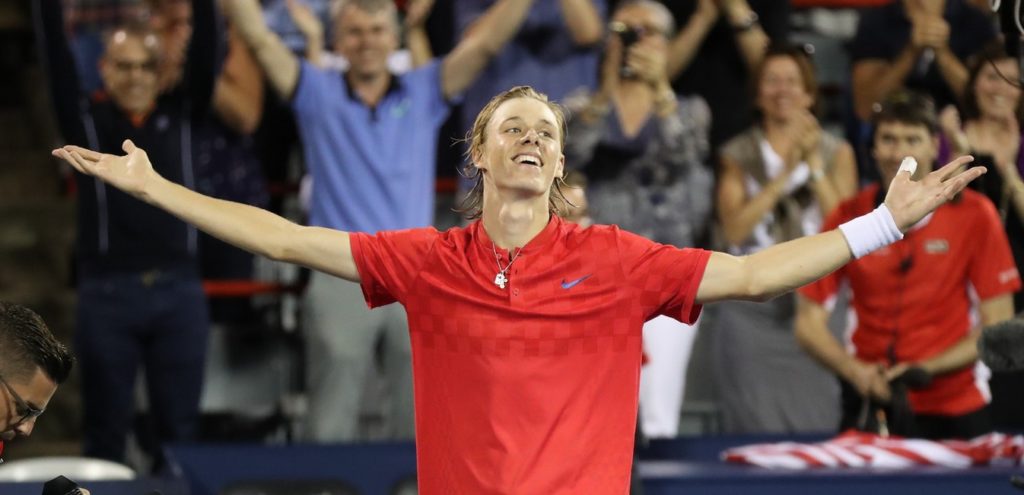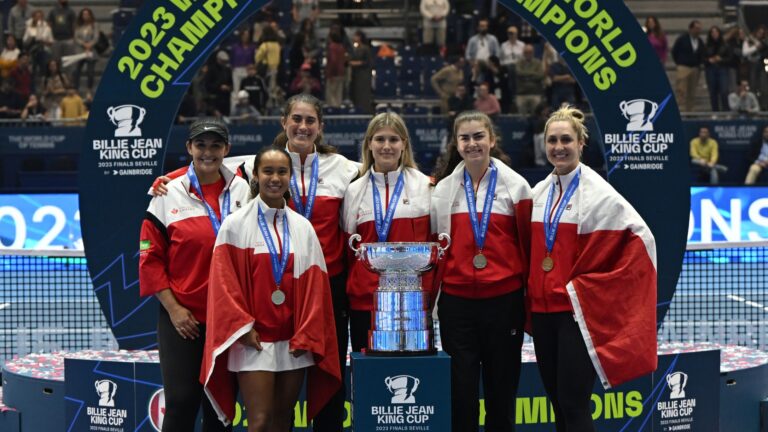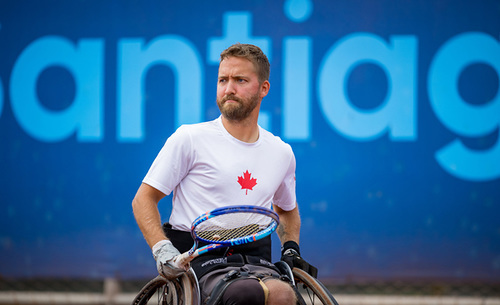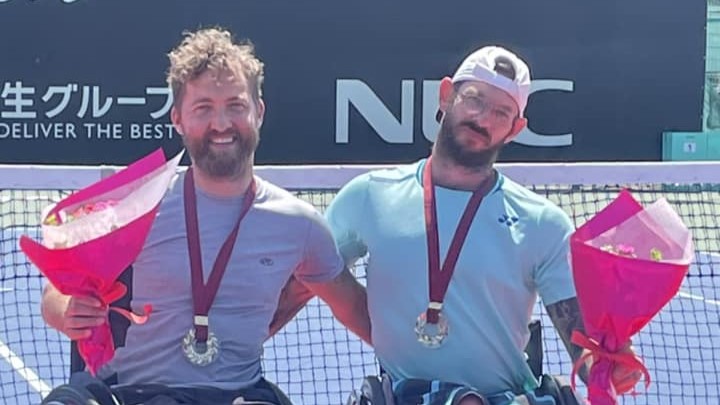
Denis Shapovalov defeated Rafael Nadal 3-6, 6-4, 7-6(4) with a stunning display before an overflow crowd of delirious Montreal tennis fans at the Rogers Cup on Thursday night.
Afterward Nadal suggested that it wasn’t so surprising that the 18-year-old didn’t crack under the pressure. “You’re 18 to not hold (have) the nerves,” he said in his accented English. “In my opinion, is much more easy when you have 18 than when you have 30.” (Nadal is actually 31.)
So maybe it was that youthful fearlessness that enabled him to play a spectacular match to upset the world No. 2 and 15-time Grand Slam champion.
Or maybe it was just that Shapovalov is a player good enough that he will be able to continue to play the same free-swinging, aggressive tennis to beat the best in the world over the next weeks, months and years.
Or maybe they’re mutually inclusive.
Over the two hours and 45 minutes of the third-round match Shapovalov could hardly have been more impressive – especially after losing the first set. Playing Roger Federer is like having a whirling dervish on the other side of the net coming at you from every angle. Playing Nadal is more akin to being bludgeoned with heavy topspin shots that are intended to grind you down and break your spirit.
That Shapovalov was able to keep the belief and have the physical endurance to come back against a titan like Nadal is remarkable.
He did so many things well – the forehand was dynamite and any time he got short ball it was almost automatic that he would hit it somewhere Nadal wasn’t – putting it away for a winner.
His stylish one-handed backhand was solid and stood up well against his fellow lefthander’s two-handed backhand. He picked his spots smartly when attacking, returned aggressively and volleyed well.

His serving was great and, though MPH isn’t that important – his fastest serve was 216 km/hr (134 mph) while Roger Federer’s fastest earlier in the day in a win over David Ferrer was only 201 km/hr (125 mph).
“It’s a lot to take in, obviously,” Shapovalov said reacting to the win over a living legend like Nadal.
He added some perspective, continuing, “but, you know, to be honest, I’m very thankful that I’m in this position. If I didn’t save those four match points in the first round (against No. 64-ranked Rogerio Dutra Silva of Brazil), there wouldn’t even be a chance to play Juan Martin (del Potro on Wednesday) or Rafa. I’m very thankful for that.”
Nadal was disappointed in himself for not playing more aggressively, for not capitalizing on six break points in the final set and for not being able to win the final-set tiebreak after taking a 3-0 lead. He claimed it was his worst match of the year although it is difficult to imagine anything quite as bad as his performance in a 6-2, 6-3 loss to Federer in Indian Wells in March.
He did say that Shapovalov “has everything to become a great player,” and even managed to summon a hint of humour when he spoke about what was at stake for Shapovalov in the match. “He has nothing to lose,” Nadal said, “is win-to-win for him. If he lose playing a good match, was good for him. If he lose in straight sets, already he played a good tournament. If he win, he’s amazing. He won. Is amazing for him. Just well done for him. Is a great story. And I am not happy to be part of this story. That’s it, no?”
Fortune favours the brave and the stats tell the story of who was the bolder player – and it was not the 31-year-old veteran but the frisky youngster who is still eligible to play the juniors. Shapovalov had 49 winners (33 on the forehand side) and 41 unforced errors compared with 18 winners and 29 unforced errors for Nadal.
“He’s honestly the best player I’ve ever played in my life,” Shapovalov said about Nadal. “You could tell why he’s won so many Grand Slams. His ball was just so heavy. He’s such a warrior out there. So it’s honestly like a dream come true for me to beat a player like that.”
The crowd at STADE IGA was whole-heartedly behind Shapovalov, erupting into great explosions of sound whenever he did something special.
In the afternoon on Thursday, Frenchman Thierry Champion, who currently coaches Adrian Mannarino, who Shapovalov will face in a Friday evening quarter-final at 6:30 p.m. ET, talked about the precocious Canadian. “I’ve been watching him for three years because I generally watch all the young players,” said the former No. 44-ranked (1991) Champion, who has coached a variety of French players from Paul-Henri Mathieu to Gael Monfils, from Julien Benneteau to Richard Gasquet. “I’d been hearing about Félix (Auger-Aliassime) and Denis.
“What I like about Denis is that he’s fiery. He was on court with Benoit Paire a couple of days before the tournament started. For a player who’s still a junior, I thought that the way he uses his serve is exceptional. He has a good first serve but he also has a very good second serve and on top of that he’s left-handed – so it’s hard to return.
“With a lot of players that are destined to be really good often it’s said that they have to be strong technically, tactically and physically etc. but there’s something else that’s important component – it’s playing well on the big courts, the big stage. Not everyone has that, being able to play their best tennis there. Even if he’s very young – he’s got that. I didn’t see his first match but to win it like he did (saving four match points), that shows he’s not intimidated. He won that match with guts.
“I really like the spontaneity of his hitting on the forehand side – he goes for it, he goes after the points, he doesn’t hesitate. He’s a bit feisty and I like that too.”

As for Shapovalov’s own coach, Canadian Davis Cup captain Martin Laurendeau, he spoke presciently before the match about what he was most proud of in his player. “He has improved in many areas of his game,” Laurendeau said about Shapovalov, “but it’s probably the way he manages a match, the fine-tuning of his competitive skills. In the first match (Dutra Silva) I thought he was a bit too subdued – controlling his emotions too much. Then he found that right place in the del Potro match. He’s still learning but he’s really paying attention to that.”
Expanding on how he works on that aspect with Shapovalov, Laurendeau said, “you make him realize the importance of the competitive skills. You’re training to compete so we work on those skills in practice. If you don’t have that in practice you can’t just whip it out of the hat on gameday. He’s honed his skills on the practice courts and he’s worked on that as much as he’s worked on his returns, volleys and the rest of his game.
“It’s a way of thinking that has to be constantly groomed. It’s not to be taken for granted. At a certain level everybody can hit forehands and backhands and you’ve got to pay attention to that part because that’s what makes a difference in moments when the pressure is on against certain competitors. He can win some matches by just being mentally strong on his own.”
That mental strength came in handy in crucial moments against Nadal and he will likely need it against the unheralded but crafty Mannarino, who reached the round-of-16 at Wimbledon last month before losing 6-2, 7-6(5), 6-4 to Novak Djokovic. Mannarino is a totally different type of lefthander than Nadal – he’s all about placement, spin and angle and he will put Shapovalov in some awkward spots he wasn’t in against Nadal. But the 29-year-old Frenchman can be over-powered and that’s a vulnerability Shapovalov’s must exploit to earn the victory and a spot in the semi-finals against either Sascha Zverev or Kevin Anderson.
His win over Nadal means his ranking will be roughly No. 100 next Monday – and could go inside the top-70 if he gets past Mannarino.
“I think I stayed pretty calm,” Shapovalov said about composure versus Nadal. “I played really well in the big moments. I didn’t get as tight as yesterday (Wednesday vs. del Potro). I’m not sure why. I just played really free in the (third-set) tiebreaker.”
Shapovalov fitness was put to what might be the ultimate test against the tennis monster that is Rafael Nadal. He passed with flying colours but did have some cramps afterward and had to do his media conference standing up. “It’s nothing too serious,” he said. “But just precautionary.”
There was speculation about how Shapovalov’s victory – which makes him the youngest (18 years and three months) quarter-finalist in ATP Masters 1000 history (since 1990) – on Thursday night compares with Daniel Nestor’s upset of world No. 1 Stefan Edberg on the opening night of the 1992 Canada – Sweden Davis Cup tie in Vancouver.
It’s a valid comparison. Nestor, 19 at the time, was more of an unknown bolt out of the blue then while Shapovalov, the 2016 Wimbledon junior champion, defeated world No. 47 Kyle Edmund at Queen’s Club before Wimbledon two months ago and has been widely recognized as a top prospect.
He’s much more combative and outgoing than the reserved teenaged Nestor – qualities that fire him up and endear him to spectators, especially partisans, of which there should be more than the 11,715 capacity at centre court for Friday’s evening match with Mannarino.
ROGER ‘FEDERERS’ FERRER 17 TIMES
It seems as if Roger Federer sets a new record every time he steps on the tennis court.
On Thursday in third round action at the Rogers Cup in Montreal, he didn’t set a record but he did tie one.
By defeating David Ferrer 4-6, 6-4, 6-2 he extended his unblemished record against the plucky Spaniard to 17-0. That’s the same head-to-head perfection that Ivan Lendl achieved against a hapless Tim Mayotte of the U.S. back in the 1980s and 1990s.
Being 0-17 with the great Swiss, Ferrer is the leader of a more-than-10-losses pack of respectable pros that includes Mikhail Youzhny (0-16), Jarkko Nieminen (0-15), Feliciano Lopez (0-12) and Philipp Kohlschreiber (0-11).
It’s hard to believe that No. 116 Evgeny Donskoy (Dubai in February) and No. 302 Tommy Haas (in Stuttgart in June) have beaten Federer in this glorious year of his rejuvenation, but someone of Ferrer’s calibre – a career high ranking of No. 3, seven years in the top-10 and a runner-up at the 2014 French Open – could not at least slip in one victory over the Swiss. Their first encounter was in Vienna indoors in 2003 and has now gone on for almost 14 years through to their hard-court meeting Thursday in Montreal.
“I know that every match is different,” Ferrer said referencing those losses to lesser-lights Donskoy and Haas. “Tennis is sensations and Roger in these types of tournaments (Masters 1000), in big tournaments, it’s difficult to beat him. Maybe in a less important tournament, maybe I’d have more chance.”
Speaking about Thursday’s match on centre court at STADE IGA, Ferrer said, “I began the match playing very well. Then maybe when I started the second set in the first game I didn’t play so good (a service break). After that Roger changed his strategy. He played faster (a.k.a. more aggressively) and it was difficult for me. The third set was similar. I didn’t play so good in the beginning and after that with a tennis player like Roger it’s very difficult.”
In all of his 17 matches with Federer, were there any times when Ferrer felt that he should have won? “I remember in Hamburg one year (2007) and also in Madrid (2010) I had chances and at the Masters in London (2012) I lost 6-4, 7-6,” he recalled. “I had more chances there than today. I’ve beaten every one – Rafa, Djokovic and Murray – but never Roger. Roger has a type of game that is very difficult for me. I am a consistent player and he has a lot of variety. He can play aggressively, very aggressively and I never have the feeling that I’m consistent in my game.”
Federer was asked if there was ever a sense of feeling sorry for or having pity on an opponent. “In the juniors,” he answered, “I just felt sometimes when I used to play guys, you know, somewhere in the world where I felt like technically maybe they were struggling. I just felt like, ‘oh, he’s trying so hard, he’s such a fighter. I don’t know. I feel like probably he works harder than I do, so he probably deserves it more.’ Then he beat me and I’m like, ‘I feel so bad. I’m such an idiot for falling into that trap.’
“Ever since I came on tour, I just feel like you go out there, try your best. Afterwards, if everything’s relaxed, again after the match you can go for coffee or whatever you want to do. In the moment itself, I don’t think you want to feel sorry for the guy.”
“I’m not a 100 per cent comfortable with the head-to-head I have against David because I just have way, way too much respect for him.”
When told what Federer said, the 35-year-old Spaniard (nine months younger than Federer) replied, “it’s nice that he said nice words and he has respect for me and, of course I have respect for him. He’s the best of the history.
“But don’t worry, it’s tennis and for me it’s a pleasure. I’ve played with Roger, Rafael and I’m proud of my career. Don’t worry about me if I’ve lost 17 times with Roger, I will try to win again.”
MONTREAL POST CARD
As part of Montreal’s 375th anniversary celebrations, an urban pathway has been created running all the way from the St. Lawrence River up to Mount Royal, the city’s centrepiece landmark. Above is the last section up to Mount Royal on McTavish Street, a main artery on the campus of McGill University.
FEATURE PHOTO: Arturo Velasquez/Tennis Canada







